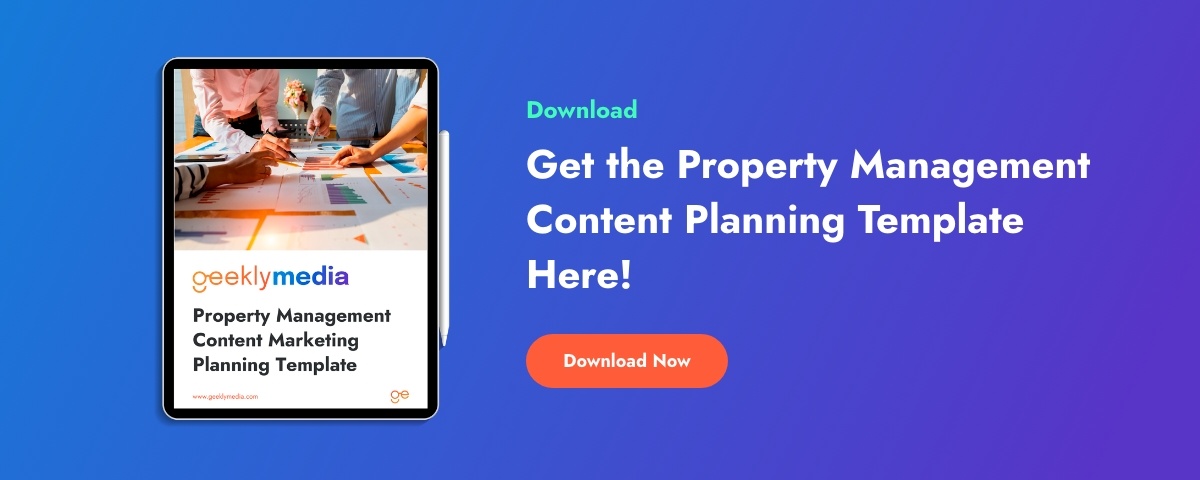
Content Marketing Metrics Property Managers Should Track (and Why)
Listen to the article
Content Marketing Metrics Property Managers Should Track (and Why)
How's your content doing? Is it delivering the traffic you need?
Content marketing has rapidly become an indispensable tool in the toolbox of savvy property managers. However, with the explosion of digital content, how do you measure the success of your property management marketing campaigns? The answer lies in content marketing metrics.
Diving deep into the numbers can offer property managers insights into what's working, what's not, and where to direct their energies next. Whether you're a novice just setting out or a seasoned expert in marketing your property management company, understanding the right metrics to track can supercharge your strategy.
Today we talk through six metrics you should be tracking (and why).
What Are Content Marketing Metrics?
Content metrics are the backbone of any successful content marketing strategy. When marketing property management companies, these metrics can mean the difference between a content piece that engages potential customers and one that falls flat.
These numbers serve as a mirror, reflecting the efficacy of your content and providing you with tangible standards of measurement. They show whether you're hitting the mark or whether it's time to iterate and pivot. 
However, which metrics you choose to focus on are determined by two pivotal factors:
-
Your overarching content goals: Before delving into metrics, you must define clear content marketing goals. These objectives might range from driving organic traffic and building authority for those just starting to increasing conversions and engaging the target audience for seasoned property managers with established companies.
-
Your monthly or quarterly priorities: After setting your goals, it's essential to outline your immediate priorities. This helps streamline which metrics are imperative to review.
Now, with an understanding of these crucial metrics, we'll talk about six specific ways to analyze your content and determine if it's helping you reach your goals.
1. Lead Generation Metrics
One of the most important things to track about your content is if it's helping you generate more leads. After all, the primary point of doing all of this content marketing "stuff" is to drive more traffic and leads to your website.
When crafting content to inform and prompt your readers to take action, it's paramount to understand and measure its effectiveness. Here's a more detailed breakdown of the core metrics that can provide insights into your content's lead generation success.
Click-through Rates (CTR)
At its essence, the click-through rate offers a snapshot of your content's compelling nature. It represents the percentage of readers who felt intrigued enough by your content to click on a specific link you provided.
Whether it's a link to another blog post, a special property listing, or a downloadable resource, a higher CTR typically indicates that your content successfully resonated with its audience. By monitoring this metric, you can fine-tune your call-to-action prompts, content positioning, and overall content strategy to engage your readers better.
Conversions
Beyond the initial click lies the all-important lead conversion. While getting a user to click on a link is a victory in itself, the ultimate goal is often to drive them toward a specific action that aligns with your business objectives.
Conversion metrics delve into the number of readers who took this desired action after clicking through. This could range from signing up for a newsletter, registering for a webinar, filling out a contact form, or scheduling a property viewing.
By tracking conversions, a property management business can assess the effectiveness of your content in nudging readers from mere interest to tangible action. It's also an excellent way to gauge the ROI of your content efforts, as each conversion potentially represents a new lead or customer for your business.
2. Brand Awareness Metrics
Brand visibility plays a pivotal role in a company's success. However, building a brand isn't merely about having an online presence; it's about ensuring that your presence resonates with and reaches your target audience.
Brand awareness metrics serve as vital indicators of your brand's digital footprint and the impact of your content marketing efforts. Here are three things to analyze.
Social Shares
In the era of social media, viral content can significantly enhance brand visibility. The number of social shares directly reflects your content's appeal and its resonance with the audience.
When readers share your content across platforms like Facebook, Twitter, LinkedIn, or Instagram, it not only amplifies its reach but also acts as an endorsement of its value. So, by tracking social shares, you can gauge which pieces of content are striking a chord with your audience and tailor your future content strategy accordingly.
Impressions
At its core, impressions represent the number of times your content appears on someone's screen. While not all impressions lead to clicks or engagement, more impressions indicate that your content is getting broader visibility.
Monitoring impressions can help you understand the efficacy of your content distribution strategy and optimize your promotional efforts for maximum exposure.
Follower Growth
Your followers are akin to your community or fans. They're the audience who've shown interest in your brand and want to stay updated with your offerings.
Tracking follower growth is essential, not just to measure your brand's expanding influence but also to ensure sustained engagement.
3. Engagement Metrics
The true potency of content isn't just in its creation but in the reactions it invokes. While having a vast audience is beneficial, an engaged audience is invaluable.
Engagement metrics offer insights into how your audience perceives and interacts with your content, making them crucial barometers of content effectiveness. Let's explore these metrics in greater depth.
Comments and Interactions
Comments are goldmines of direct feedback. They allow you to dive into the minds of your readers, offering unfiltered reactions to your content.
Whether they're praising, critiquing, or asking questions, the nature and number of comments can provide a clear picture of how impactful and evocative your content truly is. Regularly studying these interactions allows you to foster a two-way communication channel, responding to feedback and tailoring your content to serve your audience's needs better.
Average Reading Time and Page Views
While page views give an initial idea of content popularity, average reading time delves deeper, highlighting how long readers stay engaged. A discrepancy between high page views and low average reading time can indicate that while the content topic might be attractive, the content itself might not be sustaining interest.
Bounce Rates
The digital equivalent of a first impression, the bounce rate indicates the percentage of visitors who leave your site after viewing just one page.
A high bounce rate could suggest several things: perhaps the content didn't match the user's expectation, the user experience was off-putting, or the content didn't effectively guide the visitor to other parts of your website.
4. Keyword Rankings
For property managers, a well-thought-out keyword strategy can be the difference between a prospective client finding their services or being lost in the sea of competitors. Grasping the nuances of keyword rankings can significantly uplift a brand's online trajectory.
Continuously Monitor and Stay Adaptable
With search engine optimization (SEO), resting on your laurels isn't an option. Keywords that worked yesterday might not be as effective today.
However, platforms like SEMRush or Google Search Console provide a treasure trove of data, offering insights into how your content performs in search rankings. By regularly tracking which keywords are driving traffic to your website, which ones are lagging behind, and identifying new potential keywords, property managers can keep a finger on the pulse of their online visibility.
Then, as trends change, algorithms get updated, and user behaviors evolve, it's crucial to adapt. A static keyword strategy can quickly become outdated, leading to diminishing returns. As performance metrics evolve, it's crucial to adjust keyword strategies accordingly.
This might involve prioritizing new keywords, revising content to better align with current search trends, or even overhauling content strategies to cater to a new target demographic.
5. Sales Enablement Metrics
Content plays a role in sales that's often underestimated. Beyond being informative, content has the power to guide, influence, and even persuade potential customers into making a purchase.
Understanding how content directly or indirectly affects sales can be a game-changer for businesses, especially in property management. Evaluating three key areas can help you understand how your content marketing strategies support successful sales efforts.
Consultations or Free Rental Analysis Requests
When a prospect seeks a consultation or a free rental analysis, it's a sign of budding interest, possibly triggered or nurtured by the content they consumed. Monitoring the volume and frequency of these requests can offer insights into how effectively content paints a vivid picture of a product or service.
A surge in demo requests after publishing a certain piece of content can indicate its high persuasive power.
Sales Conversion Rate
The sales conversion rate bridges the gap between passive content consumption and active purchasing decisions. It provides a lens into how many content consumers are taking the next step to become paying customers.
Analyzing this metric in conjunction with specific content pieces can highlight what type of content — be it blog posts, case studies, or webinars — has the most potent sales-driving potential.
Sales Cycle Length
The journey from a prospect's first interaction with a brand to their final purchase decision can vary significantly. The sales cycle length metric offers a glimpse into the duration of this journey.
By understanding the length and intricacies of this cycle, property management businesses can better tailor their content strategies.
6. Traffic Sources
Where is your traffic coming from? How do they find your content?
Every click, every visit, every scroll tells a story about a potential customer's path to your content. Knowing the origin points of your readers can be invaluable in honing marketing strategies and ensuring efforts are channeled efficiently and effectively.
Identifying Primary Traffic-Driving Platforms
Some readers might discover your content through a simple Google search, while others might stumble upon it via a tweet or a LinkedIn post. By identifying which platforms drive the most traffic — whether it's search engines, social media channels, referral sites, or direct entries — you can gain insights into where your content truly resonates.
This information can then guide content distribution efforts, ensuring you're meeting your audience where they are and maximizing your content's reach and impact.
Understanding the Organic vs. Paid Traffic Dynamic
The age-old debate of organic versus paid traffic isn't about superiority but balance and alignment with business goals.
Organic traffic stemming from non-paid search results or unsponsored social media shares speaks volumes about the inherent value and SEO effectiveness of your content. It's a testament to your brand's natural resonance in the digital ecosystem.
On the flip side, paid traffic, generated through sponsored ads or promoted posts, offers a more controlled and targeted approach to reaching potential customers. By understanding the balance between these two, businesses can make informed decisions about their marketing budgets.
 Optimize Your Content Marketing Strategy With Insights from Key Metrics
Optimize Your Content Marketing Strategy With Insights from Key Metrics
In the competitive world of property management marketing, understanding and optimizing your content is paramount. Remember: every number tells a story. By listening intently and watching the right metrics, you ensure your content marketing efforts are not just good, but exceptional.
If you're ready to learn more about these metrics and how to use them to bolster your strategy, generating more traffic and leads, Geekly Media can help. Our combined experience and expertise in both property management and content marketing helps property managers get better results from content to drive more organic traffic.
Reach out to talk with us, or start by requesting a free copy of our exclusive resource for property managers, the "Property Management Content Marketing Planning Template."


-1.png)

